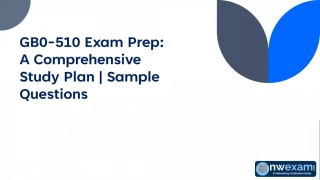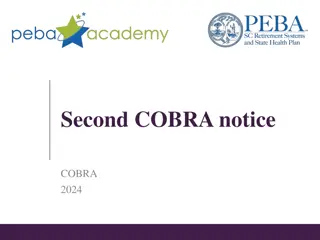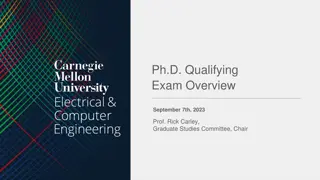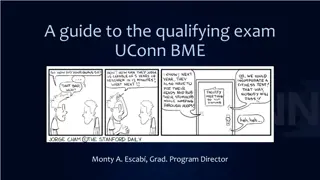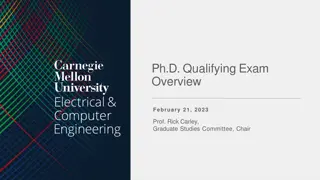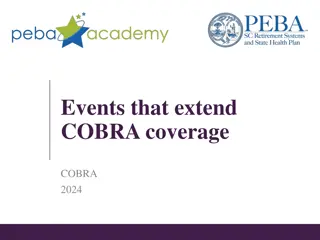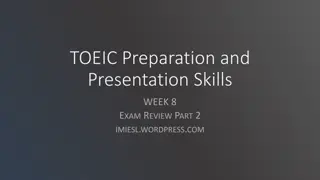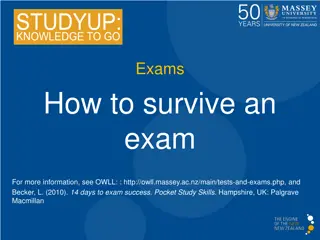Tips for Acing Your Qualifying Exam or Defense
Begin preparing early for your qualifying exam or defense by staying organized, collecting study resources, and studying with peers. Don't underestimate the importance of involving your committee members in the process and seeking feedback from them. Avoid tackling this challenge alone and leverage the support and insight of others to boost your preparation effectively.
Download Presentation

Please find below an Image/Link to download the presentation.
The content on the website is provided AS IS for your information and personal use only. It may not be sold, licensed, or shared on other websites without obtaining consent from the author. Download presentation by click this link. If you encounter any issues during the download, it is possible that the publisher has removed the file from their server.
E N D
Presentation Transcript
PREPARING FOR YOUR QUALIFYING EXAM OR DEFENSE Yes it s scary, but you CAN do it! Ren e Rioux
Prepare early Even on Day 1 of graduate school, you know this prelim/defense day is coming! It is never too early to start preparing. Know your university s prelim and defense requirements Routinely check in with your advisor and student services coordinator to know when to schedule earlier rather than later; its always easier to push a date back How to prepare? Keep organized binders of ALL your course material At the end of a course, write yourself a study guide outlining all the major concepts and relative references; then you only need to return to your study guide when it comes time to study Collect study resources early in your graduate career and review them at the end of each semester to see if you learned something particularly relevant to a certain subject area
Dont do it alone Bacteria survive best in groups, and so will you! It is often said that the best way to learn is by teaching. When you study with others, you find yourself discussing and teaching the material to your peers, whether you meant to or not. Aside from the opportunities for discussion, studying with a group brings together diverse view points. Another student may have had a different course or instructor than you who emphasized different concepts Another student may have expertise in a different area than yourself; you can help each other learn about your respective strong areas Making a commitment to study with someone else is likely to give you more motivation to buckle down and study!
Ask your committee members Ok, this one is REALLY, REALLY important Do NOT go into a prelim/defense situation without checking in with your committee members beforehand. Just. Don t. Do. It. I know you think they re busy, but here s a little secret: They like to know that you need them and respect their opinion. Plus, if they are too busy, they will let you know! The best way to check in with your committee members is to schedule a meeting (or phone call) with them at least once a semester or so. (And, ideally, you ll be in touch with them much more frequently)
Ask your committee members (continued) When you meet with your committee members, make sure you have a couple specific areas you want to discuss or questions for them Don t expect them to know what you want to talk about! At the very least, e-mail and check in with your committee members in the weeks leading up to your exam or defense Ask if they have concerns or comments it is MUCH better to hear these before your exam so that you have time to prepare! Again, it is best to ask about specific areas that are related to an individual committee member s area of expertise. Checking in has the added benefit of encouraging your committee members to look at the material sooner rather than later. BONUS Some committee members will let you know specifically what you will be asked!
Dont limit yourself Too many students take on the mentality that they are going into extension, so molecular plant pathology doesn t matter; or they are a molecular plant pathologist, so epidemiology doesn t mater; or who really needs to know stats anyway?; you get the picture Don t fall into this trap! A plant pathologist needs to have at least a basic understanding of all aspects of the discipline Depending on the make up of your committee, you may need to be more well-versed in some areas than others Hint: Having a committee with diverse expertise will help you to become a more well-rounded scientist and more well-rounded scientists are more likely to get jobs!
You know more than you think you do We tend to be our own harshest critics For that reason, we often get a question that we don t think we know the answer to, but we really do Practice with tough questions and draw on what you do know, trying to put together an answer from that Have someone review your answer and give you additional tips You re likely to find out that you came a lot closer to nailing the answer than you thought! Come test time, do the same! Don t leave an answer blank/refuse to answer at all Volunteer the info you do know; in an oral exam, your committee members will often then help/lead you to the answer
Its OK to say I dont know (in an oral exam) Yes I know I just said that you know more than you think you do BUT Committee members are really good at sniffing out lies If you really, honestly, and truly have no idea, it is perfectly acceptable to admit that you aren t sure And, sometimes, no one may know the answer because there may, in fact, be no known answer (this is science, afterall)! In this case, again, you will often be asked a few questions or given a few hints that will help jog your memory Just don t say I don t know too often! For a written exam, try to remember and write down anything that you can think of. The plus here is you can skip the question and come back to it later, after you ve been able to dreg up some knowledge from the depths of your brain
Youre not supposed to win (in an oral exam) You re going up against four, five, or more professors that s decades of experience and a whole lot of knowledge in varying topic areas No one expects you to know as much as the combined knowledge of your entire committee You are expected to be articulate, show a strong understanding of the basic principles in plant pathology, be an expert on your research project and, perhaps most importantly, demonstrate the ability to think critically (like a scientist)! It should be difficult, you should feel challenged, and you will, mostly likely, leave the room wondering what the heck just happened and, possibly, shaking from adrenaline But then they open the door a few minutes later, tell you that you passed with flying colors, and the sweet celebrations begin!
Read the literature! You learn a lot in classes but the most up-to-date source of information on plant pathology is the literature Keep abreast of the hottest new finds in plant pathology by regularly checking APS journals (MPMI, Phytopathology, Plant Disease) Also, be sure to read any pathology articles that come through Nature and Science And read all recent articles from your committee members! Social media can also be a great way to keep up on the literature! Follow established scientists/organizations and check out the papers they recommend This often alerts you to great research in journals you may not check regularly Identify 3-5 major papers from the most recent year or couple years Be prepared to justify why you find these papers to be particularly high impact
Have an example for each type of pathogen Yes, you most likely work on primarily one type of pathogen But, as a well-rounded pathologist, you should be familiar with the basics of all pathosystems For any prelim, be able to offer a detailed explanation (including general and specific mechanisms of pathogenicity, host defense measures, and how the pathogen might overcome host defenses) for one example organism from each of the major pathogen groups Be comfortable discussing this pathosystem in both physiological and molecular terms
Know what to expect It is hard to come up with a brand new set of questions for every prelim Professors tend to recycle or reword prior questions and often ask questions in a similar topic area Ask peers who have already gone through a prelim with your committee members about the type of questions they were asked This is in addition to speaking with the professors themselves, as was mentioned earlier Many departments make old written qualifying exam questions available If this is true for your department, get your hands one every old exam you can and treat them like your study guides!
Some general tips Set aside plenty of time to study, make it a routine, and try to go about it in a systematic way It s been said this before, but seek help from others as much as possible Just before the exam, remember to eat well and get plenty of sleep Breathe!!! Be confident Try to have fun with it!



